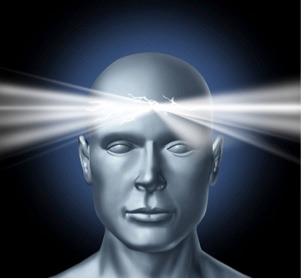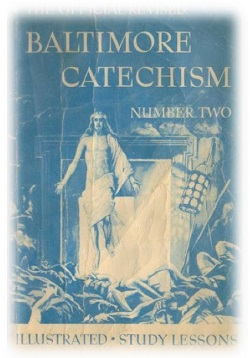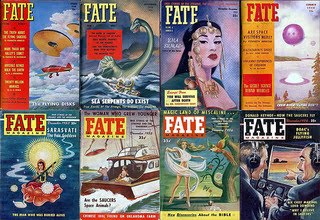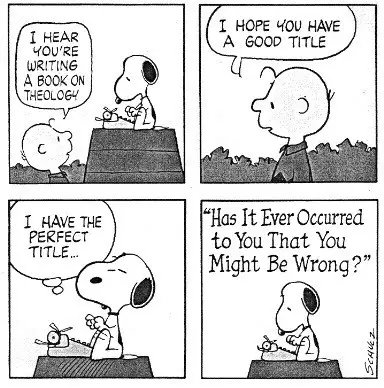|
TRANSLATE THIS ARTICLE
Integral World: Exploring Theories of Everything
An independent forum for a critical discussion of the integral philosophy of Ken Wilber
 David Christopher Lane, Ph.D.
Professor of Philosophy, Mt. San Antonio College Lecturer in Religious Studies, California State University, Long Beach Author of Exposing Cults: When the Skeptical Mind Confronts the Mystical (New York and London: Garland Publishers, 1994) and The Radhasoami Tradition: A Critical History of Guru Succession (New York and London: Garland Publishers, 1992). David Christopher Lane, Ph.D.
Professor of Philosophy, Mt. San Antonio College Lecturer in Religious Studies, California State University, Long Beach Author of Exposing Cults: When the Skeptical Mind Confronts the Mystical (New York and London: Garland Publishers, 1994) and The Radhasoami Tradition: A Critical History of Guru Succession (New York and London: Garland Publishers, 1992).SEE MORE ESSAYS WRITTEN BY DAVID LANE Being Skeptical of SkepticsEntering the Paranormal Stream of ConsciousnessDavid Lane
The problem on either side of the knowledge equation is a simple one. How willing are we to be wrong?
I was brought up as a believer. My first indoctrination was within the Roman Catholic Church, where unbeknownst to me I was immersed in baptismal waters before I could even utter a coherent sentence. My parents, particularly my father, were regular weekly mass attenders, and me and my two brothers and one sister all attended Catholic schools from first grade until the end of high school. I received my first communion at the age of 7 and was genuinely moved by the ritual, so much so that our first grade nun, the wonderful Sister Susanna singled me out the next day and said that I was the only one out of some 40 or so students who truly appreciated the sacramental moment. 
Although I was taught the Baltimore catechism, a near century old text of all things orthodox in Catholic dogma, I was never very good at mastering its arcane strictures. Indeed, in third grade we had a fairly vicious nun of the Blessed Virgin Mary order or BVM for short (which we mischievously translated as “black veiled monsters”) who created an intellectual baseball game based on questions from the catechism. Answer an easy question (was Jesus the son of God?) and you advanced to first base. Answer a more difficult question, such as what is the Immaculate Conception? (Mary was freed from original sin even in the womb), and you got to round the bases for a home run. Needless to say, I never got to second base. As a young devotee immersed in the life and work of Catholic saints (I chose my confirmation name from St. Francis Xavier, famous for his missionary work in India) I made a wager at the age of eight or nine with my childhood friend Pat Donahue that I would one day become a monk. Of course, that never panned out since I was far too attracted to the opposite sex to burden myself with a vow of celibacy. However, at the age of ten and eleven I became quite interested in Eastern philosophy and religion and this, along with my mother doubting Pope Paul VI�s Encyclical Letter, Humane Vitae (which condemned artificial birth control) jilted my rigid and parochial belief system. This was perhaps the beginning of my evolving skeptical attitude towards all things religious, particularly ideologies that demanded blind allegiance. I was still deeply interested in the spiritual quest, though, and at the age of 15 I had a genuinely transformative experience when I spoke in tongues after a charismatic mass held at Loyola Marymount in Los Angeles, which I have written about in more detail elsewhere. The glossolalia moment opened me up to all things paranormal, even if I was resistant to ritualized calcifications. I had a number of wondrous and (at the time) inexplicable experiences, ranging from a spontaneous, albeit partial awakening of my kundalini to a quasi near-death experience where I felt completely removed from my body and entered into (what I sensed was) another world. In this regard, I was open to the interior quest and fully engaged myself in pursuing it. But at the same time I also developed a questioning attitude about the various interpretations that were almost invariably intertwined with such experiences. For instance, even though I was mesmerized by speaking in tongues I rejected the Christian party line that it was a unique gift only bestowed on those who accepted Jesus as their personal Lord and Savior. After doing the “breath of fire” exercise during an intense yoga session at the old redwood temple at the back of the Source restaurant in Hollywood I was quite bemused to actually feel a five pointed star of energy in my upturned left hand. Yet I resisted Father Yod�s superluminal explanation and instead reflected that it was probably due to something psychosomatic.
This two-pronged approach of mine occasionally gave me an epistemological headache.
This two-pronged approach of mine—being experientially engaged and skeptically analytical—occasionally gave me an epistemological headache. Nevertheless, it allowed me to witness some quite impressive, if not altogether paranormal, happenings. I was also a romantic of sorts and thus had a fondness for mystical literature, particularly tales that described enlightened states of awareness. In the early 1980s I wrote a number of articles and book reviews for Fate Magazine, which was devoted to unexplained phenomena, such as UFOs, astrology, ghosts, clairvoyance, and all things bizarre. By the late 1980s I was even teaching a graduate course on parapsychology at the University of Humanistic Studies in Del Mar. 
Yet, something snapped in me along the way, which made me wary of paranormal claims in general, and I changed from being a potential believer to a more hard lined skeptic. I am sure part of this transformation was due to my critical analyses of a number of new age religions and their leaders during my undergraduate and graduate studies. Metaphorically speaking, when I was younger I was like Dorothy in the Wizard of Oz and naively followed the yellow brick road and found the Emerald City and its designated leader enchanting, but when I got a bit older (and like Toto who pulled back the curtain on the Wizard only to find a balloonist from Kansas) and saw what went on behind the inflated scenery of the guru game, I became disillusioned with the hype that surrounded much of the transpersonal quest. I also saw how easy it was to be duped by alleged miracle workers, whether it was Sathya Sai Baba�s bad sleight of hand magic tricks or John-Roger Hinkins faking psychic knowledge when, in fact, he wiretapped his own house and eavesdropped on unsuspecting students. I became suspicious of paranormal claims in general. I became jaded. All of this, of course, may be chalked up to growing older and part of the natural progression of developing a more rationalist approach to the world at large. But being overly skeptical can devolve (as it too often does) into cranky cynicism that ends up cutting one off from new information and new vistas. Science is truly a wonderful pursuit but its shadow is scientism and sometimes one can conflate them, mistakenly believing they are one and the same when, in fact, they are polar opposites. Hang out with naive believers long enough and you can start accepting all sorts of silliness as true, such as when a Christian preacher suggests that he would accept that 2 = 2 equals 5 if it was written in the Bible, since the Bible cannot be doubted. On the other hand, hang out with cynical skeptics long enough and you can too readily dismiss any new form of knowledge, since it doesn�t fit into your model of how the universe should operate. A sad, but telling example of this kind of resistant mindset can be found in the old Soviet Union with Trofim Lysenko�s adamant rejection of Mendelian genetics and how politics trumped open ended science. The problem on either side of the knowledge equation is a simple one. How willing are we to be wrong? Or, put in a different way, what kind of evidence is sufficient to change our mind? Are we so set in our paradigmatic ways that we refuse to even consider alternatives that don�t fit our favored models? The knife of reason cuts both ways and all too often we may find ourselves protecting our cherished ideals versus truly reconsidering what we believe in light of new and compelling findings. Sam Harris in a recent debate with Daniel Dennett over free will captured the difficulty humans have in actually changing their minds when we are already deeply entrenched in a particular position. Cautions Harris, “In recent years, I have spent so much time debating scientists, philosophers, and other scholars that I�ve begun to doubt whether any smart person retains the ability to change his mind. This is one of the great scandals of intellectual life: The virtues of rational discourse are everywhere espoused, and yet witnessing someone relinquish a cherished opinion in real time is about as common as seeing a supernova explode overhead. The perpetual stalemate one encounters in public debates is annoying because it is so clearly the product of motivated reasoning, self-deception, and other failures of rationality—and yet we�ve grown to expect it on every topic, no matter how intelligent and well-intentioned the participants.” Jonathan Haidt, ironically, wrote an essay entitled “Why Sam Harris is Unlikely to Change his Mind” based on a questionable analysis of how many times “certainty” buzz words show up in Harris� two books, The End of Faith and The Moral Landscape [For Harris' response, see "The Pleasure of Changing My Mind"]. Haidt found that “Of the 75,000 words in The End of Faith, 2.24% of them connote or are associated with certainty. (I also analyzed The Moral Landscape—it came out at 2.34%.” Haidt claimed that the percentage of “certainty” words (such as “always”, “never”, “undeniable”, etc.) in Harris� two tomes was significantly greater than what he found in Ann Coulter�s Treason, Sean Hannity�s Deliver Us From Evil and Glenn Beck�s Common Sense. Based upon this shaky scaffolding, Haidt confidently wagered a 10,000 dollar bet that Sam Harris would not change his mind about his thesis in The Moral Landscape. As Haidt explains, “In the opening paragraph of his Enquiry Concerning the Principles of Morals, David Hume described the futility of arguing with people who are overly certain about their principles. He noted that �as reasoning is not the source, whence [such a] disputant derives his tenets; it is in vain to expect, that any logic, which speaks not to the affections, will ever engage him to embrace sounder principles.� If Hume is right, then what is the likely outcome of The Moral Landscape Challenge? What are the odds that anyone will change Harris�s mind with a reasoned essay of under 1000 words? I�ll put my money on Hume and issue my own challenge, The Righteous Mind challenge: If anyone can convince Harris to renounce his views, I�ll pay Harris the $10,000 that it would cost him to do so.” What Haidt is pointing out (even if we disagree with his methodology) is that human reason is a flawed instrument and while we may think we are being tolerant and reasonable other factors (including deep seated emotions and biases) come into play and may sway us blindly in directions we don�t expect. I know in my own life that what I found convincing and evidential at one age (at 17, say) seemed much less so at another age (50, say). The real culprit here may well be our confused evolutionary history, where our brains are more or less jerry rigged with not always complementary agendas. While the triune brain analogy may be overused and not altogether accurate, it does provide us with a glimpse of why we behave in such contrarian ways. Employing a metaphor from Star Trek and cribbing Edward O. Wilson�s terminology from Consilience, our brain is one confused enterprise indeed: The rational part of ourselves--the cerebral cortex--is Spock or Data like, where logic and reason holds court (what Wilson calls “heartless”); the emotional part of ourselves--the midbrain is Captain Kirk (what Wilson calls “heartstrings”); and the brute physical part of ourselves--the reptilian brain stem--is Scotty, the engine master (what Wilson calls “heartbeats”). Granted that the Enterprise metaphor is a bit silly and not altogether accurate, but there is one telling point that holds up: Captain Kirk drives the ship, just as our emotional selves are the driving forces in our own lives. We may wish to be purely logical or Spockian in our views, but the truth is that we are a combinatorial creature with competing forces at play. I think Errol Flynn, the famous movie actor of the 1930s/1940s and the raucously funny author of My Wicked Wicked Ways, summed up the human dilemma quite nicely when he opined about himself that he was “an octagon of contradictions which may in itself be no contradiction.” I fondly remember my old Ph.D. advisor, Professor Bennett Berger from UCSD, who used to chuckle after reading how authors responded to scathing reviews of their texts in the New York Review of Books. Berger noticed that rarely, if ever, did an impugned author ever admit that the reviewer was perfectly justified in his critique. Rather, such authors write long-winded rejoinders explaining how they were wrongly mistreated.
It isn�t easy to switch allegiances, especially if one has invested lots of time and energy in a particular purview
It isn�t easy to switch allegiances, especially if one has invested lots of time and energy in a particular purview. Instead, we tend to indulge in all sorts of ideological work to reconcile whatever gaps may exist between our pet model and contrarian findings. Perhaps the jetty between those who profess to be skeptics and those who profess to be believers isn�t as wide and jagged as we might at first suspect. Perhaps the impasse has more to do with how interested and passionate we are in contravening our cherished inclinations. Once we become settled and comfortable in our positions, how often do we venture out and spend serious time trying to upend what we hold to be true? If we are creationists, how much time and effort do we give to truly grasping molecular and evolutionary biology? Conversely, if we are evolutionists, how much attention and serious study to we give to works espousing intelligent design? As Jonathan Haidt pointedly explains, “In the 1980s and 1990s, social psychologists began documenting the awesome power of “motivated reasoning” and the “confirmation bias.” People deploy their reasoning powers to find support for what they want to believe. Nobody has yet found a way to �debias� people—to train people to look for evidence on the other side—once emotions or self-interest are activated. Also in the 1990s, the neuroscientist Antonio Damasio showed that reasoning depends on emotional reactions. When emotional areas of the brain are damaged, people don�t become more rational; instead, they lose the ability to evaluate propositions intuitively and their reasoning gets bogged down in minutiae.” I have also noticed that in my own online debates with various posters over the years that there was some issues (usually related to theological claims) which really got under my skin and which brought out more piss and vinegar in my ripostes�, whereas other topics left me somewhat cold and neutral and which allowed me to think more freely and loosely about the argument. In other words, intellectual debates can often sink into turf wars that have more to do with protecting marked territory and less to do with discovering what is true or evidential. All of this came into sharp focus for me during the past month when I was asked by Alex Tsakiris to be interviewed for his Skeptiko podcast/website concerning my essay, “The Material Basis of Near-Death Experiences: Exploring the Patricia Churchland and the Alex Tsakiris Controversy” which was published on Frank Visser�s Integral World. To prepare for the conversation I spent time going through a number of Alex Tsakiris� previous interviews, particularly those that disagreed with his pro parapsychology perspective. I also spent a fairly large amount of time reviewing current books and articles on Near-Death experiences. Back in the late 1970s and early 1980s I read everything I could on this subject, since Raymond Moody�s bestseller, Life After Life, opened up the field to a wider audience. I even had the occasion of hearing personally from NDE survivors and I was intrigued (and sometimes bemused) by what they recollected. One of my high school students at Moreau back in 1979 talked privately to me after class and said that he too had an NDE but was reluctant to tell anyone about it because he didn�t see Jesus or a religious figure. Instead, he told me that he went through a long dark tunnel and at the end in a brilliant scintillating light he saw the most beautiful bicycle ever. The moment he saw the bike he remembered that his birthday was in a couple of days and that his Mom had promised to buy him a Schwinn ten speed. That very thought brought him immediately back to his body and he regained consciousness in the emergency room. Later he was told that he had died on the operating table but was resuscitated minutes later. I must confess that I was surprised to learn how much the field of NDE�s has grown over the past few decades and how affirmative a number of doctors and scientists have been about the trans-neuronal nature of such experiences. The skeptic in me has tended over the years to see NDEs as part and parcel of how consciousness as a virtual simulator will project anything from our unconscious to encourage us to stay alive. This made sense to me since the one common denominator in all NDE recollections is that the patient did not die but lived long enough to report such transcendental happenings. Yet, the more I read and studied NDE literature the more I realized that my own pet theory was in the minority, and that a sizable number of NDE researchers were convinced that near-death experiences were not merely the result of cerebral anoxia or some other brain machination. Indeed, many of these researchers (some with quite impressive credentials) were fully convinced that consciousness survives death and that a purely materialist explanation was insufficient to explain such numinous epiphanies. While I still have a persistent bias that those favoring mysticism and parapsychology are better served by skeptics than they might at first suspect, I realized that there were serious researchers who were punching holes into my self as brain compound and that it might be wiser to simply listen to what they had to say instead of prematurely theorizing their findings away. This, of course, doesn�t mean that I have let go of neurophilosophy and the like, but only that science works better when we take seriously those ideas which upend what we ourselves believe is true. To accomplish this lofty goal, we have to always be open to being wrong, even if goes against our genetic grain. I don�t want to be wrong, but in the past 57 years on this planet I know all too well how often I have been mistaken about so many things. Yes, no doubt, there is much in parapsychology and the like that is nonsense, but the same can be said as well about some aspects of science, especially in fields like medicine which are still in their infancy. The good news is that this is an exciting time since the Internet has allowed more voices to be heard than ever in the history of humankind and thus we live at a moment where information is not the sole province of only priests or an elite oligarchy. While I think it is altogether wise to be doubtful of extraordinary claims, I think it is also prudent to be skeptical of our own skepticism. As Richard Haidt confessed at the end of his critique of Sam Harris, “If we want to improve our politics and our society, let�s be reasonable about reason and its limitations. Of course, I have used my powers of reasoning (and intuition) to write this essay, and I have drawn on scientific studies to back up my claim that Harris is unlikely to change his mind and renounce his claims about morality. But people are complicated and it�s always hazardous to use scientific studies to predict the behavior of an individual. I could well be wrong.” 
|